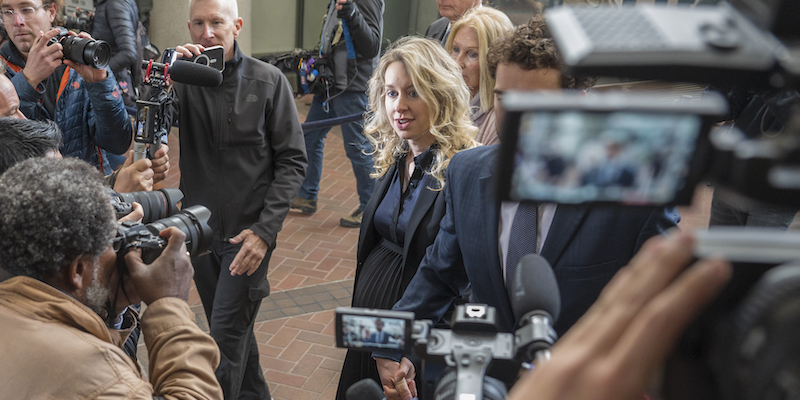Friday, at the end of a hearing that lasted about four hours, a Californian federal court he condemned US entrepreneur Elizabeth Holmes was given 11 years and three months in prison, found guilty of fraud last January in the context of a trial concerning Theranos, the biomedical startup of which she is the founder and CEO. Holmes had been accused of lying and deceiving Theranos investors and customers for years, promising them revolutionary blood-testing technology that was never developed because the company’s products didn’t work.
The Holmes trial, very popular in the United States, was started in September 2021 and the court’s decision on the sentence was expected today.
Holmes, who is 38 years old and pregnant with her second child, risked up to 20 years in prison: the sentence established by the judge is lower than that proposed by the prosecution, which he had asked 15 years, but much higher than what was proposed by Holmes’s lawyers, who had asked for a sentence not exceeding 18 months, to be carried out in home detention. The judge, Edward Davila, said that Holmes will have to show up in prison on April 27, and that the 11 years and three months of detention will be followed by three years of probation.
The judge also said that the amount of compensation Holmes owed to the investors will be established in a separate hearing: the prosecution had proposed about 800 million dollars, but during today’s hearing the judge he said to have estimated a loss for investors of approximately 121 million dollars.
Holmes has 14 days to appeal: he is expected to do so, although his lawyers have not yet commented.
Theranos story is one of the most significant in the US technology industry, where it has been defined as the “Biggest scam ever”. It has been the subject of books, podcasts, documentaries and has had a huge effect on the entire tech industry.
Founded in 2003, Theranos had become one of the most promising startups in Silicon Valley in just a few years. Holmes raised several hundreds of millions of dollars in investments in a few years with the promise that he would invent a machine capable of performing more than 240 different blood tests by taking just a drop of blood from patients, rather than several test tubes as would be normal. Holmes herself became famous and was praised as the symbol of a new generation of brilliant entrepreneurs, at a time when everyone was looking for the new Steve Jobs.
Theranos bankruptcy occurred in a very few months: it began in October 2015, with the release on Wall Street Journal from an article signed by journalist John Carreyrou. In the article, Carreyrou wrote, using the testimonies of some of the startup’s employees, that the innovative machine for making analyzes starting from a single drop of blood – called Edison, named after the American inventor Thomas Edison – simply didn’t work.
Carreyrou’s work was then integrated by other investigative journalists: it was discovered not only that Edison didn’t work, but that in some cases the results of the analyzes were wrong to the point of being dangerous for the patients.
Holmes and Theranos management initially tried to deny the allegations, but it soon became impossible to continue doing so: Theranos went from a valuation of about $9 billion to zero in just a year, before finally going out of business in 2018.
Holmes’s trial had been observed with great attention above all by those who deal with technology companies in the United States and have for some time been reporting how many of these receive billionaire investments and quotations on the basis of simple promises, despite the lack of concrete products to offer to their customers. Who had taken Holmes’s side he had argued that she was unjustly blamed and that failure is a common occurrence for many young entrepreneurs.
Last January, Holmes was found guilty on four counts of fraud, including the most important count of lying to Theranos investors. Instead, she was found innocent of four other charges that concerned her relationships with the patients of the trials.
– Read also: The story of Theranos, explained well

![[Mercato USA]Stocks rebound, even more interest rate hike speculation is buying the dominant dollar into the low-140 yen range – Bloomberg [Mercato USA]Stocks rebound, even more interest rate hike speculation is buying the dominant dollar into the low-140 yen range – Bloomberg](https://assets.bwbx.io/images/users/iqjWHBFdfxIU/itVevWAshS9c/v1/1200x800.jpg)